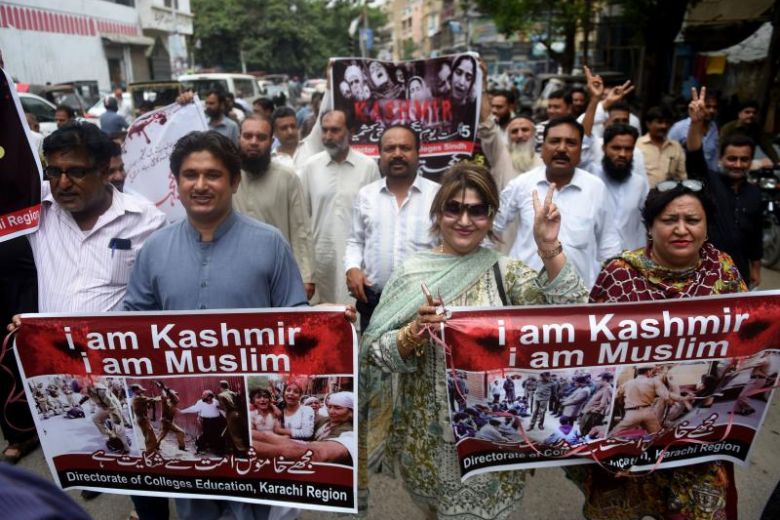Kashmir Reading Room releases report marking one year of abrogation of Article 370

TCN News
Kashmir: Kashmir Reading Room has released a report marking one year of the de-operationalization of Article 370, and unilateral revocation of Kashmir’s special status by the government of India on August 5, 2019.
The report titled ‘(Dis)Integration at Gunpoint’ is prepared by Kashmir Reading Room (KRR) which was set up in 2014 by a group of working professionals including lawyers, doctors, academicians, researchers, activists, and journalists. KRR, which is a team of professionals who are based in different parts of the world, attended the report’s online launch on August 4, 2020, at 8.30 PM IST. The session was hosted by South Asia Solidarity Group in London where Prof Hameeda Nayeem, Sanjay Kak (Independent filmmaker), and Parvez Imroz (Human Rights lawyer) were the anellists.
At the launch, Prof Hameeda Nayeem congratulated KRR on the report calling it “the first draft of the history of the last 1 year.” She stated that although it traces a one year trajectory of human rights violation, press gag and communication lockdown but “it goes much beyond that.” She informed that the report combines various news reports, statements by political representatives and other interactions, letters, and statements. She expressed that what Kashmiris felt on August 5 is “something inexpressible, unnarratable and unspeakable,” and that is why the annual report is of “great value not only to the common person but also to researchers.”
She expressed that during the lockdown, the people did not understand how they were abruptly cut off from the whole world while in a huge deluge and such initiatives taken by organizations like KRR to promote free political thought is significant.
The panelists then discussed how August 5, 2019, is marked by Kashmiris as a day when India’s expansionist policy on Kashmir “has been laid bare in an undeniable manner.” Parvez Imroz, Human Rights lawyer with JKCCS while commenting on the Kashmir conflict said that, “Truth is a major casualty in any conflict area.” He discussed India’s gripping control of the people of Kashmir and thanked KRR for adopting mechanisms of active and comprehensive dialogue to generate international awareness on the conflict in Jammu and Kashmir. He then mentioned Newton’s law indicating that India’s repressive measures against the territories cannot continue for long as evident in Newton's law. “There will be a reaction,” he said.
Commenting on the Indian Judiciary’s approach to Kashmir Imroz said, “Judiciary is complicit by their omissions in not taking measures to protect human rights.” He accused the judiciary of being a failure while noting that this report has in fact documented all the changes taking place on the political, legal, policy, and economic sphere since August 2019 in the bifurcated territories.
Speaking on the report, Sanjay Kak said, “The KRR Report looks at (it) in a comprehensive way of the undivided Jammu & Kashmir.” He informed that although the entire region has been covered, the report also mentions Gilgit, Baltistan and Ladakh. Kak also encouraged KRR for including “an excellent chapter on minorities on Kashmir,” which most people don't talk about, he said. He welcomed this approach where the fact-finding committee has “moved beyond Kashmiri Pandits and has also spoken about Kashmiri Sikhs and Shias.” When asked about the question of Kashmiri Pandits, he said, “It's not only Kashmir that needs to ensure the safety of Kashmiri Pandits but also Kashmiri Pandits who need to ensure the safety of Kashmir.”
The panelists highlighted that the report comprehensively covers a wide range of subjects from recent changes in Domicile law; amendments of laws affecting the transfer of state land to non-state subjects and corporate entities; mining rights; developments in Constitutional Courts concerning the amendment to Article 370; treatment of PSA petitions; Habeas Corpus litigation and media petitions in the last year. Other attendees noted that it has included perspectives from minorities and voices from Ladakh, Jammu, and the Kashmir valley while additionally providing an overview of the human rights violations, curbs on freedom of the press, repression of Kashmiri journalists, and disenfranchisement of Kashmiris.
In the ending session, KRR iterated that the report is specially prepared to generate international awareness and dialogue concerning developments and that it would prove to be instrumental in the resolution of the Kashmir conflict. The full report can be accessed here: https://jklpp.org/kashmir-reading-room-report-aug-2019-aug-2020/
